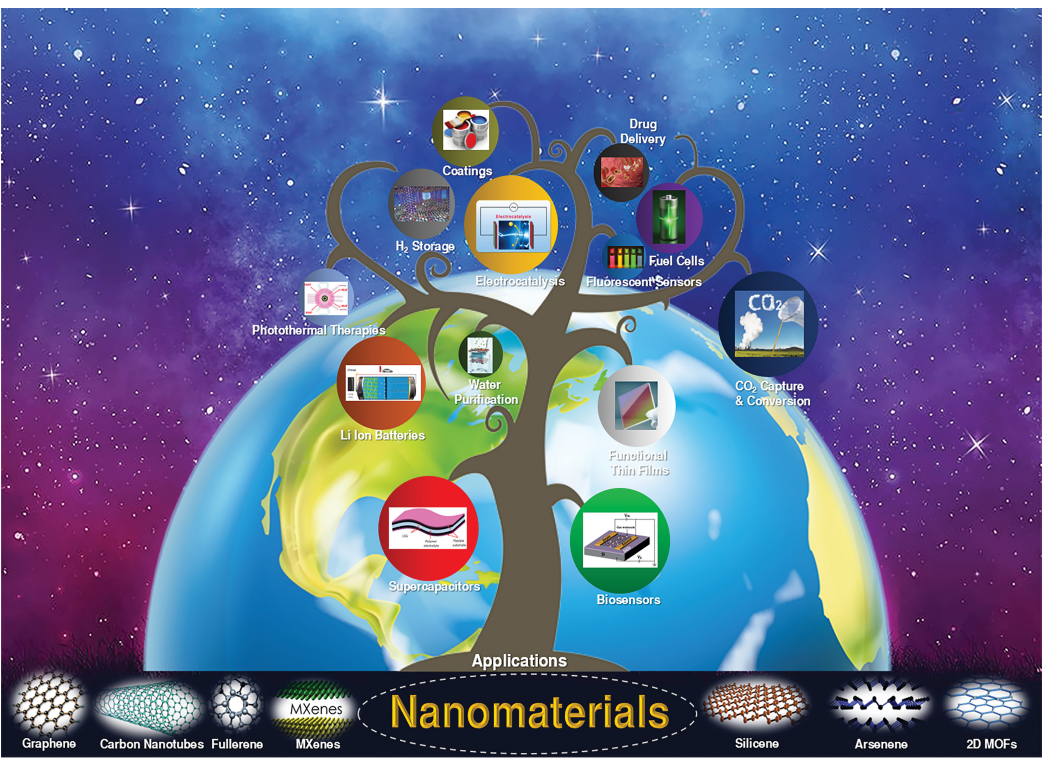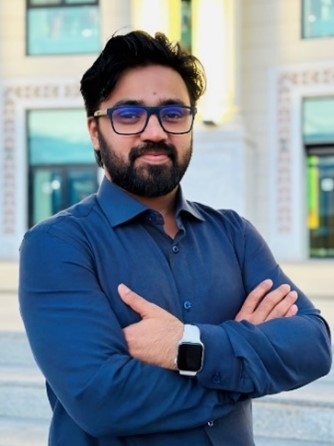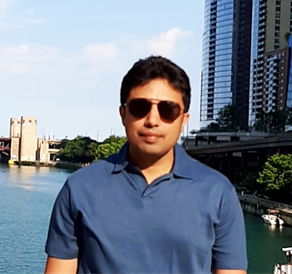Nanomaterials: a review of synthesis methods, properties, recent progress, and challenges has been one of the most highly cited articles published in Materials Advances so far. The authors have recently answered our questions, and in this blog, we are sharing the insights from our interview with them. We congratulate the authors on their impactful work and wish them success in their future academic research.
- What aspect of your work are you most excited about at the moment?
Access to clean water is a growing global issue. A recent report by UNESCO reveals that 2 billion individuals do not have access to safe drinking water. Furthermore, the region where we reside (Saudi Arabia) has already declared a water-stress region. We are designing advanced membranes for desalination and water reuse, which may contribute to meeting global and regional demand in the future. Our research group is developing next-generation membranes using 2D materials. The 2D materials we use can be divided into two classes specifically for membrane applications. The first class has ordered pores, such as COFs and 2D MOFs, whereas the other type is intrinsically non-porous, such as graphene, MXenes, and TMDs. Our research group is working on tuning the interlayer distance of the non-porous 2D sheets to control the permeability and selectivity of these membranes according to the desired applications. We believe that the tunability of the 2D membranes makes them unique compared to the state-of-the-art commercialized polymeric membranes.
- What do you find most challenging about your research?
Fouling remains a significant challenge in the implementation of membrane-based technology. Therefore, most of the industries still have not adopted membrane-based technology. 2D materials-based membranes look promising at the lab scale to develop antifouling membranes, but their processability and scalability would be challenging. Our research group is currently working on a lab scale at IRC-Membranes Water Security, KFUPM, but we are planning and working to bring them from the lab scale to the market.
- What does it mean to you to have a highly cited article?
It is a gratifying experience for a researcher to receive recognition for his work from their peers in the same field.
- How do you feel about Materials Advances as a place to publish research on this topic?
Materials Advances has emerged as a prestigious journal of the Materials family. Material Advances platform provides a distinctive opportunity for researchers to publish their latest findings in materials science. Due to its high-quality publications, this journal has become a hub of material science progress and knowledge.
- Can you share one piece of career-related advice or wisdom with other early career scientists?
I advise early career researchers to identify global problems and research gaps and put their best efforts into solving them to become impactful. Do the brainstorming by What, why, and how. What is the problem, why is it, and how can it be solved? Keep pushing towards your goals and dreams, overcoming obstacles and challenges, until you can look back proudly on your journey.
Meet the authors
Dr Nadeem Baig is a Research Scientist III (Assistant Professor) at IRC-Membrane and Water Security, KFUPM. He obtained his BS (Hons.) from the University of the Punjab in 2008 and his MPhil from the University of Engineering and Technology, Lahore in 2012. He obtained his Ph.D. from KFUPM, Saudi Arabia, in 2017. Dr Baig joined the Center of Research Excellence in Desalination & Water Treatment at KFUPM in 2020 after working as a two-year postdoctoral researcher. His research is focused on developing next-generation membranes utilizing 2D materials, including graphene, MXene, TMDs, 2D MOFs, and COFs for oil/water separation, desalination, water reuse, and recovering precious metals. His interests also include developing nanostructured materials and super-selective surfaces for energy and environmental applications. He has received several distinguished awards. So far, Dr Baig has obtained 10 US patents. Dr Baig received the prestigious Early Career Research Award at KFUPM in 2022. His name was also included among the top 2% of scientists worldwide in the discipline of Chemistry.
 Dr Irshad Kammakakam is an Assistant Professor in the Department of Chemistry at Nazarbayev University, Astana, Kazakhstan. Dr Kammakakam received his Ph.D. in Chemistry from Incheon National University, South Korea. His research focused on developing advanced organic porous materials and functional polymeric membranes for energy-saving separation technology and environmental green energy applications. Before joining Nazarbayev University, Dr Kammakakam was a Research Scientist at the Advanced Materials Chemistry Center, Khalifa University, UAE. He also worked as a Visiting Scientist at the Korea Institute of Science and Technology (South Korea). He completed multiple Postdocs at the European Institute of Membranes (France), the University of Alabama (USA), and the KAUST (Saudi Arabia). Dr Kammakakam broadly works to design and synthesize ionic polymers for molecular separation membranes and energy storage applications. Dr Kammakakam has bagged many awards and achievements, including the recipient of the 2020 Future Faculty Mentoring Program sponsored by the EdDiv of the American Institute of Chemical Engineers.
Dr Irshad Kammakakam is an Assistant Professor in the Department of Chemistry at Nazarbayev University, Astana, Kazakhstan. Dr Kammakakam received his Ph.D. in Chemistry from Incheon National University, South Korea. His research focused on developing advanced organic porous materials and functional polymeric membranes for energy-saving separation technology and environmental green energy applications. Before joining Nazarbayev University, Dr Kammakakam was a Research Scientist at the Advanced Materials Chemistry Center, Khalifa University, UAE. He also worked as a Visiting Scientist at the Korea Institute of Science and Technology (South Korea). He completed multiple Postdocs at the European Institute of Membranes (France), the University of Alabama (USA), and the KAUST (Saudi Arabia). Dr Kammakakam broadly works to design and synthesize ionic polymers for molecular separation membranes and energy storage applications. Dr Kammakakam has bagged many awards and achievements, including the recipient of the 2020 Future Faculty Mentoring Program sponsored by the EdDiv of the American Institute of Chemical Engineers.
Dr Wail Sulaiman Falath is the Dean of the College of General Studies and an Assistant Professor at the Materials Science and Engineering Department of King Fahd University of Petroleum & Minerals. Dr Falath has a Ph.D. degree in Polymers, Textiles, and Fibers Engineering from Georgia Institute of Technology, USA. His Ph.D. was related to fabricating polymeric mixed matrix membranes for Reverse Osmosis water desalination. Dr Falath’s research is focused on the environment, synthesis of membranes for water desalination, and surface modifications and characterization of several materials.












